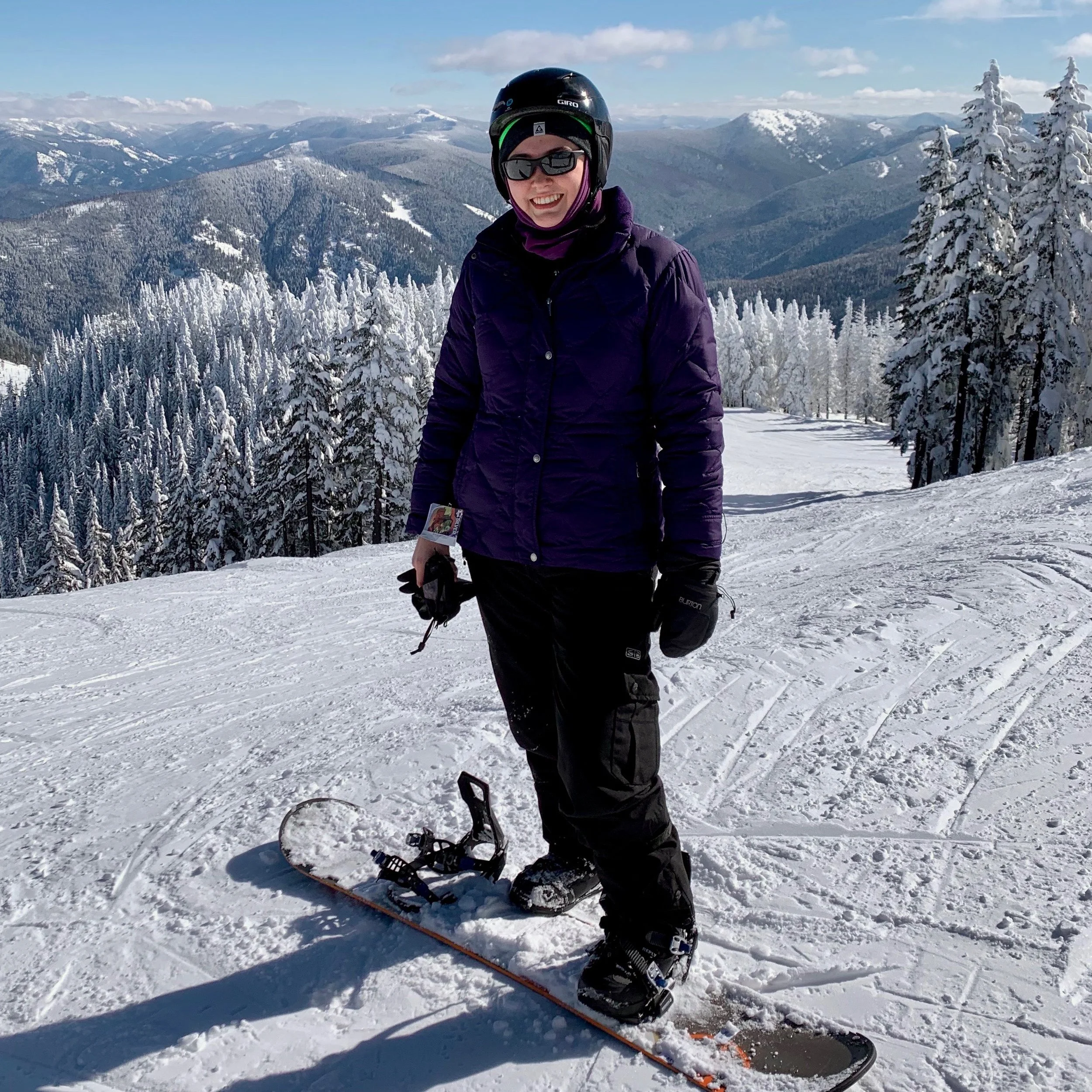Snowboarding is a rough sport even without a bleeding disorder...
Snowboarding is a rough sport even without a bleeding disorder...
Hailey on the mountain! Good advice: She always “Boards with a buddy!”
My name is Hailey, and I have two rare platelet disorders that cause my blood to not clot properly. I don’t experience spontaneous bleeds, but I have a higher risk of severe bleeds from trauma and injuries. There is a medication called Desmopressin (DDAVP) that assists my blood’s ability to clot for a short amount of time. I carry this medicine around everywhere with me (as a nasal spray) in the case of an injury.
Hemophilia alone hasn’t stopped me from doing much, but it has made me consider the activities I choose to put my body through. I decided (with a lot of convincing from my parents) that TaeKwonDo and Krav Maga probably weren’t the best sports for me. Though I agreed with my parent’s points on the matter, I had a hard time giving up something I loved so much. (Hemophilia wasn’t the only deciding factor…I also have a connective tissue disorder that causes frequent injuries, which also played a part in the decision). As irritating and sad as it was, stopping those sports opened the door for me to try new activities.
One of the most recent ones was snowboarding.
I could ski pretty well, but this was my first time strapped to a board. My two younger brothers were with me; the older one, at 18, knew exactly what to do if I hurt myself in a way that could cause a bleed. With a helmet securely strapped to my head and my clotting medication in the pocket of my fluffy down coat, I was set for the day. Was I scared? Absolutely. I knew full well the risks of a hard fall, of running into a tree, even of falling on my rear, which happens to me a lot (#clumsy). After a few hours of going down the snowy slopes, I was feeling pretty confident and started to relax my mental grip on ‘ don’t fall, don’t fall, don’t fall.’ I made the mistake every snowboarder, experienced and novice, makes.
The edge of my board caught, and I was whipped face-first into the icy, snow-packed trail. Though my knees and arms padded the fall, my head smacked into the packed snow with enough force to bring on an instant headache. I knew it was bad. I knew I was going to be sore for days. But was it enough force to cause a concussion? In a person without hemophilia, probably not. But for me? Laying in the snow for a few minutes to let the world stop spinning gave my brothers enough time to catch up. The first thing they asked was, “Do you need to take your med?” I didn’t want it. I didn’t want to deal with the side effects of a rapid heart rate and potentially blacking out. Most of all, I didn’t want the potential of a bleed/concussion to slow me down. Besides, my vision had cleared and the headache subsided. To my brother’s irritation, I got up, brushed myself off, and we kept boarding. The worst thing I imagined had just happened, and I was still standing. How bad could it really be?
By the time we got back home, my head was throbbing so intensely and my vision was cloudy. My parents strongly encouraged me to take my clotting med, convinced I had a concussion. By now, I was pretty convinced myself. My head felt like it was going to burst, between the headache and vision problems.I took the clotting med, dealt with the side effects, and made my way to bed. For almost two weeks, I battled cloudy vision, slow memory, and delayed thought processing. One inevitable fall into the hard snow caused two weeks of frustration and discomfort.
Was the decision to go snowboarding a bad one? Should I have taken the med immediately after I fell? There are always these questions. Wondering if what I choose to do will put my life at risk or be foolishly dangerous. The frustration of even having to make those decisions. Yet amidst the frustrations is the gratitude of being able to do these things at all. Of having parents, siblings, and friends who care and watch out for me. Of having medication available to slow bleeding and minimize the risk of damage from a bleed. Hemophilia isn’t all bad. It just takes a little more effort and care to do activities safely. It also repeatedly deals out slices of “humble pie” when I fail to listen to those around me—who probably know better than I do when I should take my clotting med (especially after smacking my head ;) ). The big question—will I continue snowboarding? ABSOLUTELY!!! I’ve purchased my own gear so I don’t have to deal with rental boards, and I’m eagerly awaiting the day I get to try it out. I will probably always have a buddy stay close while on the mountain in case of a fall/injury, and I’m definitely going to work hard to learn proper technique in order to minimize falls. Benefit outweighs the risk in this situation. Maybe not forever, maybe not for the whole ski season. But for right now, I’m going to keep on snowboarding with a buddy, a lot of padding, a sturdy helmet, and my clotting med safely in my pocket.
